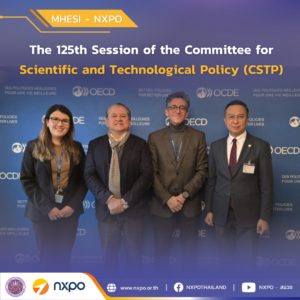Speaking recently at a seminar, MHESI Minister Prof. Dr. Anek Laothamatas presented his policy to drive Thai industry with science, technology and innovation. The seminar which focused on an offset policy in government procurement as a tool to drive technological capacity of Thai industry was organized by Chulalongkorn University Faculty of Engineering in collaboration with Thailand Science Research Innovation (TSRI), the National Science and Technology Development Agency (NSTDA), and NXPO.

In his speech, Minister Anek highlighted an importance of offset policy. An offset policy is an arrangement in which the buyer of a product is provided with additional benefits from the supplier. The arrangement is often used in government procurements involving a substantial amount of public money between the government of one country and a corporation of another country. Additional benefits can take the form of technology & knowledge transfer as well as training to increase technological capacity of the buying country. Malaysia is an example of ASEAN country that started implementing offset in the government procurement. China has been successful in employing offset arrangements to enhance its innovation capacity through technology transfer. Like Japan and Korea, China has also made substantial investment in research and development, resulting in the country being a powerhouse in technology and innovation.

“The world has changed and there are numerous suppliers of advanced technology to choose from,” said Minister Anek. “The choices are no longer confined to the West. There are now many leading manufacturers in Asia that we can work with. We need to apply offset to our procurement process to ensure that the country can benefit from technology transfer and capacity building provided by the suppliers. The scheme will help improve our innovation capacity.”

NXPO President Dr. Kitipong Promwong remarked that the offset policy has received great interest from the engineering and technology community. The offset policy will bring a paradigm shift to the procurement process, from price-based to quality purchase and long-term benefit. It represents a tool to increase the country’s innovation capacity, a key to free the nation from the middle-income trap.

“The key to successful offset policy, apart from cooperation among various agencies, including the Ministry of Finance, is the technology absorption capacity. While the foreign supplier can provide technology transfer, we need to form local offset partners to absorb technologies. Though large corporates has a higher absorption capacity, foreign suppliers prefer SMEs due to their flexibility to absorb technologies and lower cost. Therefore, SMEs should be brought into the local offset partner consortium,” said Dr. Kitipong. In addition, local academic institutes should also be included in the consortium to assist SMEs in the technology absorption process.

One of the speakers at the seminar was Ms. Nirada Werasopon, NXPO Assistant to the President. She remarked that one of NXPO missions is to create an ecosystem conducive to research and innovation by introducing suitable legal frameworks and incentives. Thailand’s innovation ecosystem is relatively favorable compared to other countries and the offset policy will provide an enormous opportunity to improve technological capacity of our industry, enabling Thai industry to participate in the global value chain. To reap the full benefits of the offset policy, a clear strategy must be developed with priority technologies and industries identified taking into account technologies that will improve Thailand’s technological self-sufficiency as well as industries that will be affected by global trends such as the energy sector that will be transformed by the zero emissions goal. “The successful policy deployment also requires effective communication, creating awareness of benefits among stakeholders and identifying a common goal,” Ms. Nirada added.







